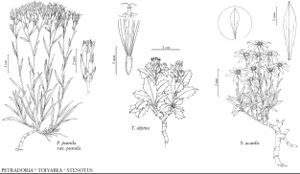Petradoria
Erythea 3: 13. 1895.
| Taxon | Illustrator ⠉ | |
|---|---|---|
 | Petradoria pumila var. pumila Toiyabea alpina Stenotus acaulis | Yevonn Wilson-Ramsey Yevonn Wilson-Ramsey Yevonn Wilson-Ramsey |
Perennials (subshrubs), 8–30 cm; taproots stout, caudices woody. Stems erect (green, becoming whitish tan with age), simple, glabrous or scabridulous, often resin-coated. Leaves basal and cauline (stiffly erect to ascending); alternate; (proximal crowded, bases sheathing, overlapping, persistent) proximal petiolate, progressively less so to sessile distally; blades 1–5-nerved (nerves ± parallel), linear to lanceolate or oblanceolate, cauline reduced distally, margins entire, scabrous, conspicuously raised, faces glabrous or scabrous, gland-dotted (in pits), resinous. Heads radiate, in densely crowded, corymbiform arrays. Involucres cylindric to turbinate, (5–9.5 ×) 1.3–3 mm. Phyllaries 10–21 in 3–6 series, in spiral or in nearly vertical ranks, 1-nerved (evident on distal 1/2 or throughout; usually weakly keeled), ovate to oblong, strongly unequal, chartaceous, margins scarious, faces glabrous, resinous. Receptacles convex, pitted (1–3 scales or awns to 1 mm sporadically present), epaleate. Ray-florets 1–3, pistillate, fertile; corollas yellow. Disc-florets (1–) 2–4 (–5), functionally staminate; corollas yellow, tubes shorter than tubular to slightly expanded distally throats, lobes 5, erect to spreading, triangular; style-branch (nonstigmatic) appendages subulate. Cypselae of ray-florets oblanceoloid, cylindric to slightly compressed, 6–9-nerved, glabrous (disc ovaries 5–6-nerved); pappi persistent, of 30–60, tan, somewhat unequal, barbellate, apically attenuate bristles in 2–3 series. x = 9.
Distribution
w United States
Discussion
Species 1.
Petradoria had included a second species, Chrysothamnus gramineus H. M. Hall, first described in Chrysothamnus in a broad sense (L. C. Anderson 1963; G. L. Nesom 2000). When effecting its transfer to Petradoria, Anderson gave it the new name P. discoidea because of the earlier combination P. graminea Wooton & Standley, now synonymized with P. pumila var. graminea.
L. C. Anderson (1986) subsequently reinstated Petradoria discoidea in the genus Chrysothamnus. After DNA-based investigations indicated that the previously hypothesized alliances of P. discoidea to Petradoria and to Chrysothamnus in the broad sense were unsupported (R. P. Roberts and L. E. Urbatsch 2004), it became the basis for the new, monospecific genus Cuniculotinus. DNA sequence studies supported a close alliance between Cuniculotinus gramineus and Sericocarpus, while Petradoria pumila and a clade consisting of Stenotus acaulis and S. armerioides were shown to be sisters (Roberts and Urbatsch; Roberts 2002). The present treatment of Petradoria is based, in part, on Anderson (1963).
Selected References
Lower Taxa
"[" is not declared as a valid unit of measurement for this property."]" is not declared as a valid unit of measurement for this property.